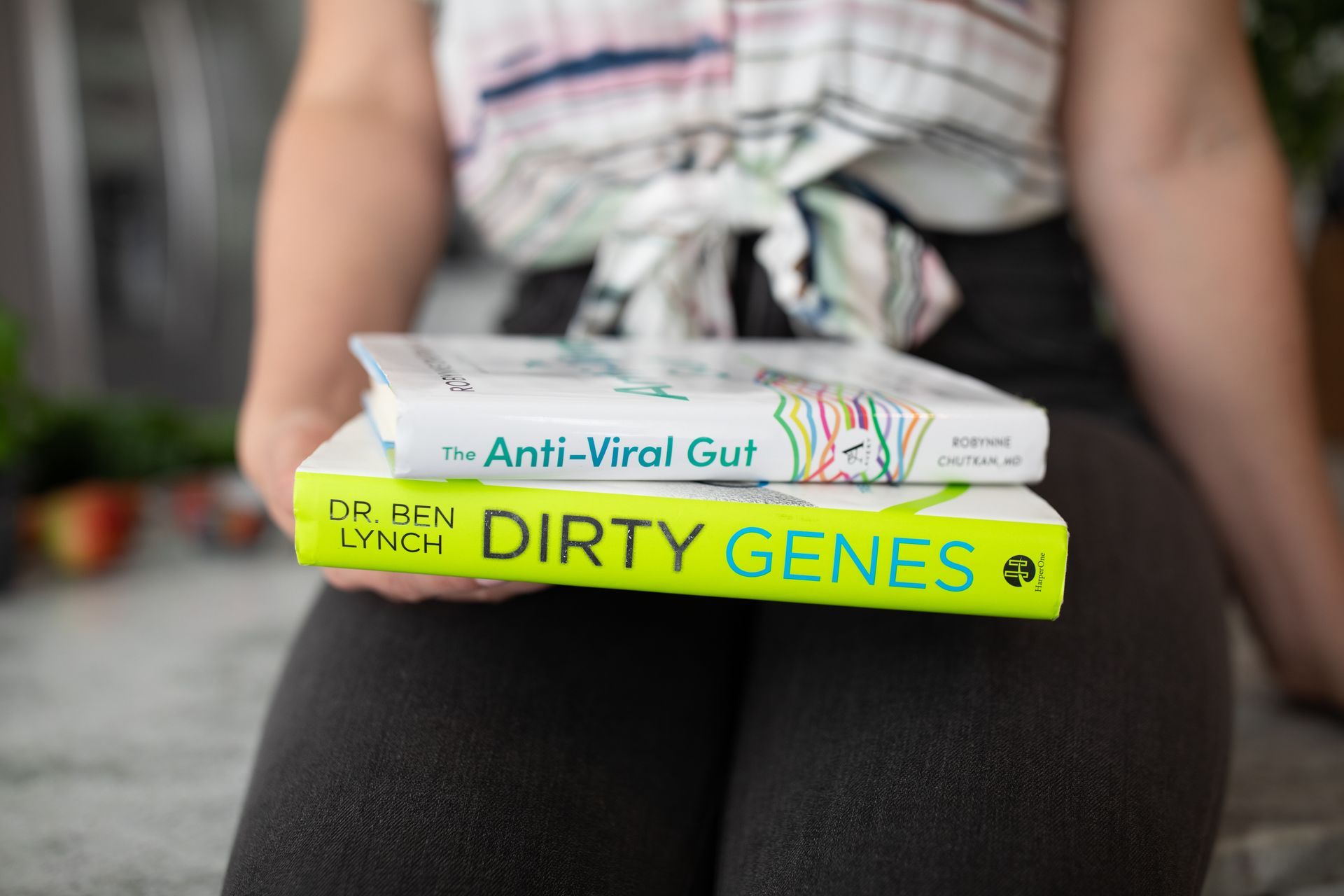From Healthy Childhood to College Crash
I grew up in the 80’s and 90’s eating the typical amount of ultra-processed foods popular during that time. I was rarely sick. I competed in multiple sports as well as dance and vocal performance. I was born Type A, and an obnoxious overachiever. Somehow this diet and lifestyle didn’t seem to affect me. I was healthy, energetic, and athletic. So far so good.
Then I went to college. That’s probably when health issues begin for many, although mine was pretty extreme especially in contrast to my seemingly invincible childhood. My freshman year was extremely stressful as I obsessed over straight A’s in my pre-med biology program, taught group classes at a gym, and waited tables part-time to help pay for my apartment and books. I had also adapted a vegetarian diet in an attempt to be “healthier”, and because I was now on my own and running 24/7, I was eating more processed soy in the form of shakes, bars, and magical tofu mixes. Alcohol intake also increased of course. Lo and behold,
I started having digestive issues
after about a year of this.
I tried my best to research and DIY a solution (remember this was at the very early stages of internet so I mostly had to read books). I tried various diets and fasts which maybe helped short-term, but constipation and bloating returned quickly after resuming a normal diet. I increased fiber, ate only fruits and vegetables (probably the worst ideas looking back), and all sorts of other food combos, potions, and supplements.
I went to a natural medicine doctor (not even sure his title!) and he suggested colonic hydrotherapy and some supplements. I slowly started to feel better, but I was afraid of regressing and still struggled to find balance in my diet. However, I was so intrigued that I got a job at a small natural food market in hopes to learn more about supplements and healthy eating. I was also spending a lot more on food than the average college kid and knew I needed to figure out a way to reduce my grocery bill!
I realized recently that maybe I haven’t published the full story of my own health journey, which was a primary inspiration for advancing my education and starting my own business to help others in finding answers about their health.
Feel free to scroll straight to the bottom if you just want my top tips for how I did it!
But I know some of you will find hope in the story.
Learning from Rock Bottom
Three years later, my life changed forever. I slipped on black ice in the parking lot of my apartment complex (ironically on the way to the gym), and shattered my ankle. I was transported to the ER and got the worst news I could ever receive–because it was such a complex fracture I would need surgery and have plates screwed in to stabilize the joint. I knew this was bad-metal permanently inserted into my body?! I was devastated and terrified.
I got through the surgery, but gained about 15 lbs in the 3 months that followed. Sure I was laying in bed a lot, but my diet was still very clean and I wasn’t eating junk or even eating very much, just smoothies and bone-supportive foods to help heal, still a lot of soy protein which was popular at the time. But nothing else in my life had drastically changed.
To make a very very long story a little shorter, I saw so many doctors, including a D.O. who I interned for during my pre-med school track. He was very kind but didn’t have any answers.
I finally found another D.O. who was also a homeopathic doctor who told me I had developed Hashimoto’s disease. She prescribed thyroid meds and told me to stop eating processed soy and reintroduce animal protein. I wasn’t ready to add animal foods back, but the medicine — and possibly cutting out processed soy — seemed to help reduce the puffiness in my face and my weight came down a little.
After several months of PT I was able to start lifting weights and running again. By the time I graduated college that year I felt pretty good but my weight was still not what I was used to and it didn’t seem to mirror the lifestyle I was living, especially as a 23-yr old when everyone else is still drinking excessively 5 nights a week and living on fast food. But I persisted,


I suddenly realized just before med school began that I would receive little to no nutrition education, and I didn’t just want to learn how to match prescription medications to symptoms. So… I took the leap and dropped out. All that hard work down the drain. But I couldn’t do it.
So I got a random job in consulting sales and began a new life. I slowly lost more weight, but my digestion was still very finicky. I had resumed teaching group fitness, and finally decided to try adding animal protein back into my diet as fatigue caught up to me. The angel of a doctor I had originally seen for my thyroid suggested I wean off medication, so I did, and I actually continued to feel a little better.
Motherhood and the Return of Symptoms
A few years passed and I got pregnant with my first daughter. I was one of those annoying people who had a totally uneventful, enjoyable pregnancy. It didn’t really phase me. I worked until 39 weeks, felt energetic, worked out the whole time, felt pretty great. I had an unmedicated birth with zero complications. It was beautiful. But then a few weeks later, my daughter became very colicky and my digestive issues had coincidentally ramped up again.
I assumed something I was eating wasn’t agreeing with both of us, so I removed gluten and dairy as a guess to see if that helped. And it did. Bloating and constipation improved, but I continued to feel extremely fatigued. Of course, my logical explanation, as well as the first 2 doctors I saw, was that I was a new mom and my daughter wasn’t sleeping through the night… blah blah… that’s all it was.
I still have those labs, and they were not good! I just hadn’t found someone who understood that “normal” is not the same as “optimal.” My thyroid was still struggling, and as I tried to go back to work with a baby who wasn’t sleeping (at least she wasn’t screaming anymore) and a high stress sales job, fatigue worsened. I did still lose my baby weight within about 7-8 months, and did slowly regain some energy so I agreed in my mind that I must’ve just been dealing with “mom brain” and stress related to having a new baby.
The Dentist Who Changed Everything
I moved jobs twice trying to figure out how to balance work and being a new mom. After the birth of my second daughter, I moved to Charlotte and was feeling the familiar fatigue I had with my first daughter. I saw 2 doctors who completely dismissed me. Then I randomly went to a biologic dentist to establish care, and he immediately asked me about my ankle surgery after reviewing my intake form and noticing mild swelling in my thyroid. He suggested the metal in my ankle may have triggered Hashimoto’s which would explain the swelling, and urged me to find another doctor who would run labs. A dentist!! That is who encouraged me not to give up in figuring out my thyroid issues! It takes a village sometimes, and I’m so thankful for him.
So… I saw another endocrinologist, and ended up crying in her office, begging her to do a full thyroid panel. She didn’t really know what I meant, my TSH was “normal,” but was kind enough to ask a few of the nurses in the practice, and one of them knew what to order. She said my T4 was actually pretty low and agreed to write me a prescription for a compounded natural thyroid medication vs synthetic T4-based meds that are most common. I had been doing my research and learned that some/many women don’t respond well to T4-only medications. Again, she clearly thought I was crazy but my kids were tearing apart her office and I was crying, so I think she just wanted me out of there!
This was really the beginning of my journey in healing from IBS and Hashimoto’s, are you exhausted already from reading this so far?? Me too! It’s such a long story, but the context is so important for understanding that I get it when you feel like you’ve been through a lot and no one hears you! I had the same story. It was a STRUGGLE for a long time. Traditional medicine is excellent for acute care, but not chronic disease. I felt like I was fighting and clawing my way back to health most of those years.

How I Finally Healed
I moved jobs twice trying to figure out how to balance work and being a new mom. After the birth of my second daughter, I moved to Charlotte and was feeling the familiar fatigue I had with my first daughter. I saw 2 doctors who completely dismissed me. Then I randomly went to a biologic dentist to establish care, and he immediately asked me about my ankle surgery after reviewing my intake form and noticing mild swelling in my thyroid.
He suggested the metal in my ankle may have triggered Hashimoto’s which would explain the swelling, and urged me to find another doctor who would run labs. A dentist!! That is who encouraged me not to give up in figuring out my thyroid issues! It takes a village sometimes, and I’m so thankful for him.
So… I saw another endocrinologist, and ended up crying in her office, begging her to do a full thyroid panel. She didn’t really know what I meant, my TSH was “normal,” but was kind enough to ask a few of the nurses in the practice, and one of them knew what to order. She said my T4 was actually pretty low and agreed to write me a prescription for a compounded natural thyroid medication vs synthetic T4-based meds that are most common. I had been doing my research and learned that some/many women don’t respond well to T4-only medications. Again, she clearly thought I was crazy but my kids were tearing apart her office and I was crying, so I think she just wanted me out of there!
What Worked for Me:
Tips from My Healing Journey
So to jump to the good part, here’s what I’ve learned over those last 20 years from school, from life, and from various practitioners and professionals along the way:
- Medicine is not a replacement for lifestyle support. Keep working on food and lifestyle to support what the medicine is doing.
- A varied diet including animal products like collagen and pastured, humanely-processed meat drastically improved my joints (I also have RA in my family history), reduced injuries, and nourished my hormones and organs. I continue to eat lots of color and fiber from fruits and vegetables as well, but restricting my diet to only these foods made it difficult for me to balance hormones and support a high level of activity. (This may not be the case for everyone, but something to consider if deficiencies persist or labs/symptoms don’t improve).
- No gluten, processed soy, or vegetable/canola/seed oils. I also avoid most corn, but do eat some organic popcorn or tortilla chips occasionally. I don’t waver on gluten at all, and I believe this has made the biggest difference for my thyroid labs. My antibodies have basically remained in remission for 7-8 years without medication (even though doctors have told me food cannot change your antibodies and they will remain elevated forever). These food products can trigger inflammation and damage to the thyroid. Sometimes dairy is a trigger, and you have to find what works for you. I eliminated dairy for 1-2 years, and then slowly reincorporated occasional cheese, ideally from goat and sheep sources which tend to be cleaner and easier to digest. This works for most of my clients, but again can take some trial and error to confirm.
- Minimize alcohol. I have found 1-2 drinks per week is usually tolerable, but if weight loss, sleep, blood sugar or hormone balance are concerns, the less alcohol the better.
- Work on the gut before anything else! If the gut isn’t digesting and absorbing properly, it is near impossible to repair other organs or hormones. Start here, save up to get proper testing and work with someone skilled in this area. Infection and digestion can be tackled first, but then don’t forget gut repair for 2-3 months at least to prevent future issues and optimize gut and metabolic health.
- Focus on the adrenals. Many thyroid problems begin here (I believe mine did). Don’t ignore stress, or “power through” for months or years on end. It will catch up with you. Sleep and play are essential to healing autoimmune disease.
- Eat the best food you can afford. Buy organic wherever you can. Buy local from regenerative farms. Meat is now one of the top sources of Omega-6 rich fats in our diet due to corn and soy-based animal feed, which can lead to excess inflammation. Chickens, pigs, and cows don’t naturally live on these foods, and it is affecting our health as well as theirs.
- Prioritize supplements based on need. Buy quality products from reputable vendors, not big box stores, social influencers, or large online retailers who don’t third-party test or verify quality. If they don’t have a COA on file, they are not third-party testing so you don’t really know what you’re getting. Avoid folic acid in processed food and supplements! This inhibits methylation which is essential to hormone health. I have found a multivitamin/mineral, fish oil, Vitamin D, magnesium, and digestive enzymes with Betaine HCl to be the most important for my body.
- Minimize medications including NSAID’s, birth control pills, reflux meds, and antibiotics. One or more doses of these meds can significantly change the gut microbiome, which in turn affects hormones and metabolism. If you are struggling to lose weight despite diet and exercise, consider the fact that these meds may have sabotaged your gut, metabolism and hormones and starting with the gut will need to be repaired.
- Prioritize rest. This means sleep but also “active rest,” which are calming activities that take us out of fight or flight mode which seems to be modern society’s default mode. I have purposely pursued gardening, cooking, hiking in the woods, and playing with my family and pets as hobbies to help give my nervous system small daily breaks from life’s demands.
- Over time, switch to clean, non-toxic makeup, skincare, and household cleaning products. Use filtered water and air purifiers as needed.
- Get sunshine daily and move your body 5-6 days per week in a way that is stimulating and energizing, not exhausting. This sometimes also requires trial and error, but usually there’s an achievable sweet spot for women trying to balance hormones and/or autoimmune disease.
Final Thoughts: Don’t Give Up
The bottom line is show up every day, take small steps, and don’t give up. There are answers, and there are people who can help you. The journey can feel discouraging and hopeless, but coming out on the other side, I can tell you I’m in a better place having gone through the challenging times because of what I learned and how it’s changed my life. There was no other way for me to learn what I did, and now I get to share it with others which is even more rewarding.
If you’ve been on an autoimmune journey, especially Hashimoto’s, what other foods, supplements, therapies, or lifestyle changes have made the most difference in helping you heal? I’d love to hear from you!



Recent Blog Posts
Share this post!
About the Author
Rhya Pachin is a licensed dietitian nutritionist who employs an "integrative" approach to support overall health rather than addressing just one symptom. As a certified LEAP therapist, she designs and supervises custom elimination diets. Her focus areas include gastrointestinal conditions like IBS and IBD, autoimmune diseases such as rheumatoid arthritis and Hashimoto's, persistent weight issues, food sensitivities, and chronic inflammatory conditions in both adults and children.



